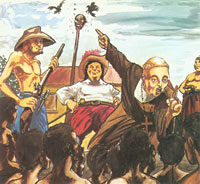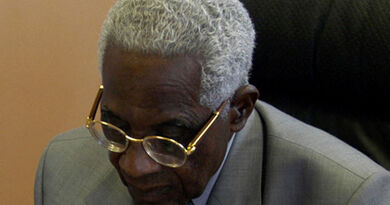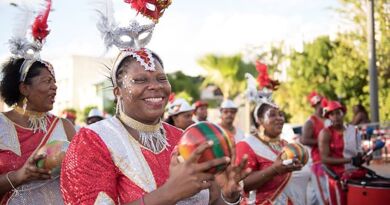What is a ‘marron’ negro?
“They call themselves the slave who runs away. No author, to our knowledge at least, gave the origin, nor the etymology, of this term. He comes to us, probably from us Spaniards, who call the fugitive Negro cimarron. They originally applied this term to animals that, from domestication, became wild, when in some accident they removed them from the midst of men, and for this reason they probably extended it to their negroes. Since they say brown pig, why not say brown nigger? There were browns as soon as there were slaves. (…) »
In the French West Indies, as in all the West Indian slave societies, the slaves never accepted their condition and always fought, by all means, against their oppressors. The forms of resistance to the slavery system were very diverse – Daily resistance (thefts, sabotage, irony, etc.).
SOME ‘MARRONS’:
POLYDOR “I will begin by quoting Polydor, an intrepid and enterprising negro who, in 1703, formed a band of brown negroes, with whom he attacked and massacred white men with impunity even in their houses, carrying audacity and crime to the point of removing them their daughters and their wives. We marched in vain against him, we could never reach him. It was only after seven of the cruelest excesses that having committed an act of violence against one of his gang, he was assassinated.
CHOCOLATE “Three years after another negro, no less barbaric and no less courageous, named Chocolat, succeeded him. He would soon have formed his gang, and he began to commit the same atrocities; smarter and finer than Polydor, he would have pushed them much further if he had not been drowned while crossing the river at Limonade, after having worried and plundered the whites for nearly twelve years.
MANCANDAL “Various circumstances having led more whites to the colony, the campaigns having been established, this means no longer seemed practicable for enterprising slaves to execute their project. A negro named Mancandai François, a man who was deeply wicked and skilful in capturing the minds of his fellows, took it to the point that they carried respect, confidence and reverence for him to the greatest fanaticism: they firmly believed that Mancandal was sent expressly from heaven to deliver all the slaves from the yoke, and even if they died for him, they would only return to their homeland within their family, to receive the reward due to their courageous devotion. When Mancandai believed he was well assured of the minds of all slaves, he resorted to a means all the more treacherous and more sure, that it was difficult to guarantee. Instead of iron, he used poison, which left no trace of the hand that had prepared it. From 1748, it wreaked terrible havoc in the cities and in the countryside: the whites ate only with trembling. ” Quoted by Victor Schoelcher: French Colonies. pp. 105-106.
THE BLACK BROWN NEGRES OF THE BLACK MOUNTAIN There were a large number of brown or fugitive negroes, who had retired to a place called the Black Mountain. They were said to number between six and seven hundred men and women; that all the men were armed; that they had steepened accessible places, by which one could go to them to attack them; that they had made fellings of trees and entrenchments, where they kept an exact guard so as not to be surprised. There was talk, during the time that I was in Santo Domingo, of assembling people of good will to go and kidnap them; but no one appeared for this expedition, where there appeared only blows to be won, and little profit to be made. Those who could have undertaken it were only the hunters or the buccaneers, who frequent these places, and who know all the ways and the parades; but these same hunters did not care to reduce these negroes, because they found their account with them. They supplied them with brown horses, hides and smoked meats at a very low price, and took in exchange powder, bullets, weapons, cloths and other things which they needed, that these hunters oversold them excessively.
Although this traffic was secret, it did not stop coming to my knowledge: and as it came there, it could come to that of many others. Indeed, we were persuaded, and we murmured loudly. This finally obliged the hunters, in order to erase the idea that we had of their lack of loyalty, to offer to go on this expedition with a good batch companion, in the manner of the Flibuste; that is to say that those who would be taken would be divided between the takers, and that for the safety of the crippled, the inhabitants would be jointly liable for their reward. No one wanted to accept these conditions, because the entire profit would have been entirely for the hunters. So the thing ended there. It seems to me that the dispute should have been split in two, in order to drive out the brown negroes from this asylum, which is a pernicious example for other slaves. Father Labat: New journey … t. IV, pp. 119-120.
Do you like the article ?
Please leave a review here.




